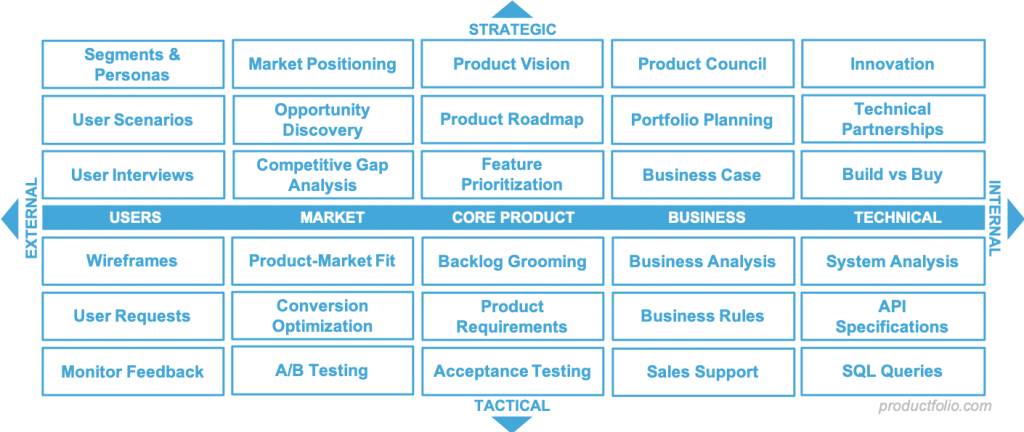What is a Technical Product Manager?
A technical product manager is a type of product manager, who works on a technical product, and thus has more technical skills. The description of this job title might make it seem like a combination of product management and engineering in one. However, it is a business role and not a technology one, even though they focus on technology.
Technical product managers adhere to the core tenets of product management while also bringing deeper technical expertise to the table. For example, they focus on the problem space and defer to their team to design solutions in response to the statement of the problem. In this regard, they are a product manager like any other. The key difference however is that some products are simply technical and require a technical background to be a proficient product manager – such as a solution designed for engineers or software developers.
In essence, a technical product manager is not that professional that takes on actual technical tasks, such as coding. They are simply product managers working in closer coordination with the engineering team.
What Does a Technical Product Manager Do?
The responsibilities of a technical product manager shouldn’t be a lot different from those of a regular PM. For instance, they are responsible for setting the vision and strategy for a product and prioritizing what the team works on.
Typical responsibilities that you may see in job descriptions for technical product managers include:
- Research and discover the latest technical or technology trends, especially in the industry
- Make recommendations on what new technologies to acquire and leverage on
- Discover and understand customer needs to effectively convert them into requirements
- Appraise new products and companies
- Being able to work well with not only engineers, developers, and architects but also operations and other teams
- Evaluate algorithms, automated systems, and data pipelines
- Examine technical risks and tackle them as appropriate
- Identify what makes for successful testing and product acceptance
- Organize beta tests
The Product Team Competencies model from Neal Cabage is a helpful tool for understanding how product roles vary by area of focus. Whereas market-facing strategy product managers tend to focus on the competencies in the upper-left of this diagram, Technical product managers tend to spend more time in the bottom-right.

Technical PM vs. Non-Technical Product
In certain cases, the line between a technical product manager and a typical product manager can become blurred. This is because many of these professionals without “technical” attached to their titles have a sound technical background. And it is not entirely impossible that you may find those designated as technical that cannot boast their level of expertise.
As mentioned already, both types of product managers have their roles overlapping in some areas. They are, for instance, responsible for strategy setting, customer research, roadmapping, and prioritization.
Typical product managers are more customer-facing and work with many non-technical teams. They give their attention to the business side of things. They are more concerned about what needs a product has to fill. Regular PMs usually assess the competition and market from the strategic business perspective.
On the other hand, technical product managers give their attention more to how the product works. They typically focus on product capabilities and the requirements that are crucial to meet the business requirements. These professionals usually work more closely with technical teams, including development and sales engineering, and may be more active in resolving customer support issues.
A technical product manager may also be more likely to hold a degree in engineering or computer science. A regular product manager, on the other hand, may more likely to have a degree in business.
Should Your Organization Have a Technical PM?
Obviously, not every organization will find creating a separate technical product manager role easy to justify. These professionals are more ideal in companies with a product management team that is sufficiently large to allow for specialization. In such settings, they tend to see to areas that require deeper technical expertise.
Technical product managers may oversee specific parts of the product suite or may be used on an as-needed basis to handle technical matters. Organizations often also turn to them when it comes to third-party technologies and capabilities, including evaluation of APIs and integration planning.
How Technical Product Managers Can Enhance Success
The following are a few of the ways these professionals can boost the likelihood of success in organizations:
Improve communication – Technical product managers can help to facilitate effective communication in organizations, thanks to their deep technical knowledge. They are in a good position to ensure healthy alignment between technical and non-technical teams.
Focus on the customer – The technical background of technical product managers doesn’t mean that they should ignore the business side. They can increase the chances of success if they are also customer-centric in their approach. If they give adequate attention to the user and their pain points, they can make the most of their technical expertise to ensure the delivery of the right products.
Better prioritization – The existence of technical PMs in organizations can help to promote improved prioritization. Their strong technical background enhances the proper assessment of features and capabilities, including the associated risks. This guides decisions on the right things to do based on factors including complexity and timelines.


